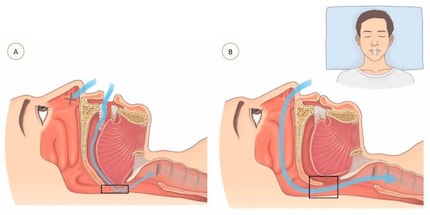

Can taping your mouth shut at night improve sleep?
Is slapping a bit of tape over your mouth before bed enough to make sleep problems a thing of the past? Sadly, it’s not that simple. In some cases, however, mouth taping can help improve sleep and reduce snoring.
A new health trend known as mouth taping has been grabbing attention on social media lately. Early adopters include celebrities such as Gwyneth Paltrow and Erling Haaland, and fans are trying it out too. But is there actually any substance to the fad? Or, to put it another way, why on earth would taping your mouth shut make you sleep better?
What is mouth taping?
Mouth taping involves using plasters or specially designed tape to seal your mouth shut at night. The idea is that by taping your mouth closed, you automatically revert to breathing through your nose. Mouth tapers place a piece of hypoallergenic adhesive tape measuring about 4 cm in length between their nose and upper lip. The tape is wide enough to cover both the upper and lower lips. Advocates of the sleep trend say it has a variety of benefits, including better sleep, reduced snoring, increased energy, an improvement in bad breath and even decelerated ageing.

The benefits of breathing through your nose
Breathing through your nose really does have some advantages over breathing through your mouth. When you breathe through your nose, the air flowing in is moistened, warmed and filtered on its way into your lungs. This reduces your risk of respiratory illnesses. What’s more, nose breathing exercises the respiratory muscles more than mouth breathing. If you breathe through your nose when you sleep anyway, taping your mouth is unnecessary.

Source: doi: 10.3390/healthcare10091755
Nose breathing might be beneficial for people with mild obstructive sleep apnoea (OSA) or disrupted breathing during sleep. Studies show that mouth breathing during sleep can constrict the throat, worsening OSA. In these cases, mouth taping could be a simple way to improve breathing during sleep, in turn alleviating symptoms such as snoring.
Scientific findings: what the research says about mouth taping
As yet, there have been very few scientific studies on mouth taping. However, a small study from 2022 involving 20 participants affected by OSA showed promising results. In fact, sixty-five per cent of them experienced a significant improvement in their symptoms. The study authors concluded that, «Mouth taping during sleep improved snoring and the severity of sleep apnoea in mouth-breathers.»
These results suggest that mouth taping could be a promising way for people with mild sleep apnoea to improve their symptoms before resorting to invasive therapies. To actually evaluate the method scientifically, however, more comprehensive studies need to be done.
Is mouth taping dangerous?
Although the body’s natural protective reflex means there’s little risk of suffocating, experts advise against experimenting with mouth taping on your own. People who have difficulty breathing through their nose due to issues such as a crooked nasal septum or allergies should be especially careful. Be aware that mouth taping isn’t a solution to severe sleep apnoea, and can in no way replace a medical diagnosis and treatment. It should always be done in consultation with a specialist in order to minimise potential risks.
Breathing exercises as an alternative to mouth taping
Instead of using tape, experts recommend simple breathing exercises that can also promote nose breathing and strengthen the respiratory muscles:
Practise conscious, through-the-nose breathing: You can use this technique any time, anywhere, and it’ll help you optimise your nasal breathing.
Breathe out for longer than you breathe in: Breathing out for longer can calm the autonomic nervous system and boost relaxation.
Practise diaphragmatic breathing: By consciously breathing into your abdomen, you increase the volume of air you breathe in. As a result, certain areas of the lungs are better oxygenated.
The verdict: mouth taping has its pros and cons
Mouth taping might be all the rage on social media, but scientific research on the subject is still very limited. The main benefit of sealing your mouth shut with tape is that it forces you to switch to nasal breathing. However, if you already breathe through your nose anyway, you can safely ignore the trend. You might benefit from mouth taping if you’re affected by OSA, but you should always consult an ENT specialist if you want to try it. If that’s the case for you, mouth taping may well help with your snoring.
Science editor and biologist. I love animals and am fascinated by plants, their abilities and everything you can do with them. That's why my favourite place is always the outdoors - somewhere in nature, preferably in my wild garden.
Interesting facts about products, behind-the-scenes looks at manufacturers and deep-dives on interesting people.
Show all

